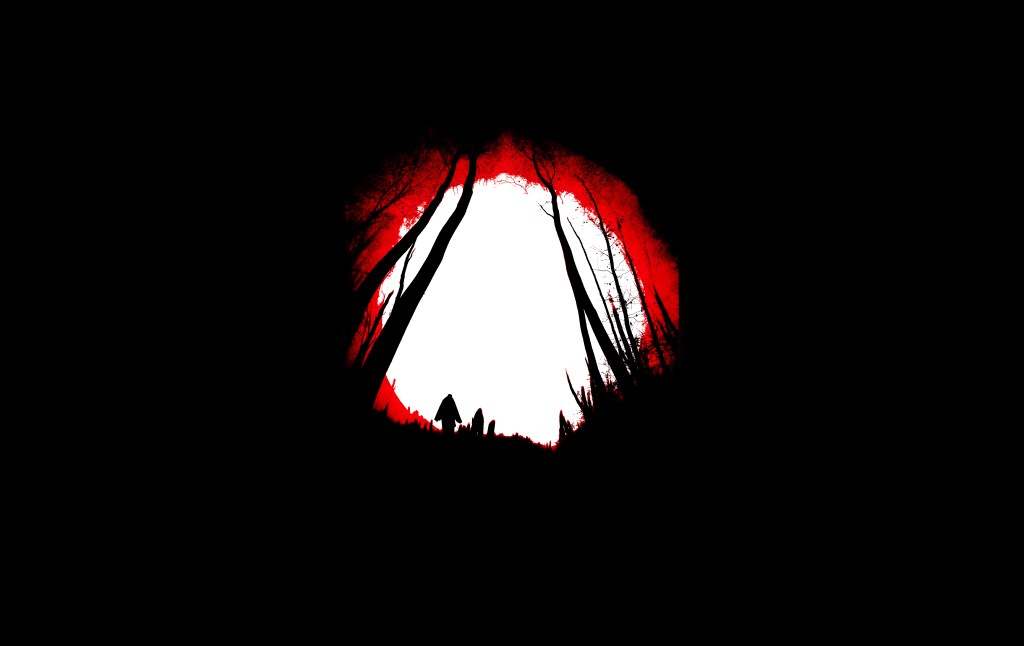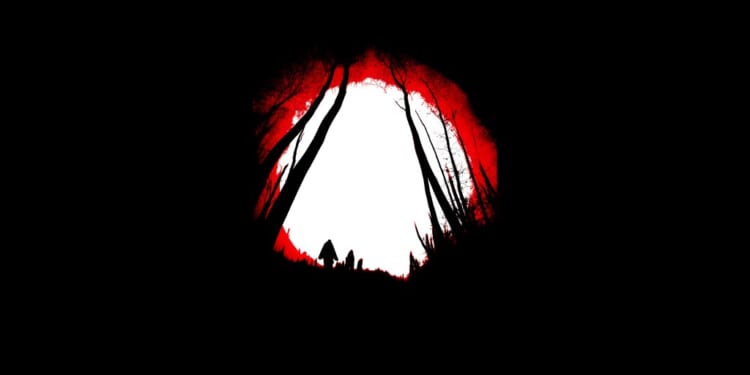
To us moderns, the most unsettling part of Robert Eggers’ 2015 movie The Witch isn’t really the titular character, or the dark woods from which she torments a Puritan family, or the black goat that spends the film leering at them knowingly. Rather, it’s a conversation the patriarch William has with his son Caleb as they search for the family’s baby, who has been spirited away for ungodly ends. “Is he in hell?” Caleb asks his father, fearing that Samuel, an unconverted infant, is dead. “Fain would I tell thee Sam sleeps in Jesus,” William sternly replies. “I cannot tell thee that. None can.”
Watching this scene as a history graduate student (at a theater not far away from where a Virginia woman was convicted of witchcraft in 1706), I couldn’t help but cackle in glee over Eggers’ attention to detail. As historians noted when the movie came out, The Witch distinguished itself not just for obsessively recreating the material culture of 1630s Massachusetts, but for its terrifyingly realistic portrayal of the 17th-century New England mind. To Calvinists like William, for whom salvation was discerned instead of earned, witches and devils weren’t just real—their presence could serve as omens of one’s own predestined damnation.
Eggers has spent the last decade crafting more uncanny windows into the past following The Witch’s award-winning debut, producing The Lighthouse (2019), The Northman (2020), and Nosferatu (2024) in quick succession. A native of New Hampshire and the son of a Shakespeare scholar, Eggers’ trademark move has been to mine primary sources from American and European history as the foundations for his frightening edifices. Neither denigrating nor celebrating Western civilization wholesale, he offers a different project entirely: a danse macabre with the irrational underside of the Enlightenment tradition that often dominates narratives about our past. By meticulously rebuilding worlds populated with witches, valkyries, revenants, and chthonic deities, Eggers wants to remind his audience of the thin veil separating today’s culture of scientific rationality and self-control from a past where chaos reigned.
One way of looking at Eggers’ movies is to see them as a pair of companion pieces. Each shot with just a handful of actors, The Witch and The Lighthouse draw on the cultural history of the American northeast to produce stagelike stories of claustrophobic folk horror. The Northman and Nosferatu, on the other hand, reach back across the Atlantic into Scandinavian and Romanian myth to resurrect grand, horrifying sagas. Despite these differences in setting and scope, these films share a common thread. In contrast to our era of endless choice, Eggers’ characters are stalked by the specter of unchosen and unshakable fates.
The Witch is told through the eyes of Thomasin (hauntingly played by Anya Taylor-Joy in her film debut), William’s teenage daughter. Although it is William’s unwillingness to renounce his fundamentalist religious views that leads to his family’s expulsion from their Puritan colony and William who lies repeatedly to his wife and children, it is Thomasin whom her parents and siblings suspect of having signed the Devil’s book following her brother’s disappearance. Eggers makes it clear from the movie’s outset that Thomasin is innocent and that there is indeed a witch in the woods who is preying on the family. But the true horror lies in Thomasin’s tortured reckoning over whether her purportedly sinful wish for butter and pretty dresses—“to live deliciously”—is proof that she has always been divinely condemned to be denied salvation and become a witch herself.
Although it is set 260 years after The Witch, The Lighthouse pulls from classical myths that significantly predate Puritan theology to spin a tale of two men’s descent into madness on an island off the coast of New England. The liquor-drenched power struggle over tending the lighthouse lantern that emerges between novice “wickie” Ephraim Winslow (Robert Pattinson) and wizened sailor Thomas Wake (Willem Dafoe) is interspersed with scenes of menacing foghorns, one-eyed seagulls, screeching merfolk, and other paranoid imagery inspired by American literature and maritime lore. But the core of the movie is as much Prometheus and Sisyphus as it is Herman Melville and H.P. Lovecraft.
Stranded after a storm prevents a relief vessel from reaching the island (which Wake blames on Winslow’s killing of a seagull, inviting bad luck), Winslow murders his superior in retaliation for both a bad performance review and for keeping the lantern to himself. But Winslow, whose real name is also revealed to be Thomas, sees something eldritch in the light that drives him to bloodcurdling delirium. A final shot of Winslow being eaten alive by seagulls suggests that he is trapped in a time-bending cycle of inescapable temptation and self-destruction, where the line separating the two Thomases is muddier than it appears.
As Eggers’ most modern character, Winslow’s storyline is particularly ironic. His coveting of both technology and the kind of recommendation from Wake that would enable him to secure a decent career and some financial independence—as he puts it, “to raise my own roof, somewhere up country, with no one to tell me ‘what for’”—echoes cultural preoccupations that run, tentacle-like, through the 21st century. Yet these desires are exactly what condemn him to an ancient punishment.
While Winslow stumbles drunkenly into his fate, Eggers’ oldest protagonist actively pursues it. A reconstruction of the Danish legend that inspired Shakespeare’s Hamlet, The Northman follows the first-century Prince Amleth (Alexander Skarsgard) on his journey to take revenge on his uncle for killing his father and abducting his mother. Neither a straightforward horror nor a historical epic, The Northman instead embodies a tonal strangeness through its unrestrained acceptance of the Viking worldview. Informed as a child by his father’s jester-mystic (portrayed again by a deliciously deranged Dafoe) that “your fate is set and you cannot escape it,” Amleth tries to turn away from his grim mission after he learns that his mother Gudrún (Nicole Kidman), once an enslaved concubine to King Aurvandill (Ethan Hawke), engineered the plot to overthrow her abuser. But Amleth’s decision is short-lived. After falling in love with Olga (Anya Taylor-Joy), a Slavic pagan taken as a captive during one of his uncle’s raids, he realizes that their future children will never be safe while his uncle lives—and so he resumes his murderous quest, to the gods’ delight.
With Odin himself depicted as guiding Amleth toward his destiny, it is striking that Olga challenges Amleth to consider whether the “Norns of Fate have spun another thread for you to follow.” While Amleth ultimately ignores her provocation, Eggers’ decision to include this moment illuminates the unusual role that women tend to play in his films. While most of his male characters are prisoners of fate (wittingly or otherwise), his female characters find ways to negotiate with the ghastly circumstances in which they find themselves. While some feminist interpretations of The Witch are too celebratory—in the end, Thomasin’s options are as constrained by a demonic patriarchy as they are by a religious one—the path she ultimately follows is at least a choice she makes herself. In The Northman, Olga uses her natural and magical cunning to free herself from slavery. And it is perhaps because there are no women in The Lighthouse (besides a hallucinatory mermaid) that the film basically reads as a comedy about two men being buffeted about by forces beyond their mortal comprehension.
It is in Nosferatu that Eggers most explicitly studies a woman’s struggle with her fate before she embraces it—on her terms. He distinguishes his adaptation from the original 1922 film and the first 1979 remake by centering Ellen Hutter (Lily-Rose Depp) as the protagonist, rather than her husband Thomas (Nicholas Hoult) or the monstrous Count Orlok (an unrecognizable Bill Skarsgard). In Eggers’ version of the story, Ellen’s possession of mystic sensibilities drives Orlok’s interest in her and sets the plot in motion.
As in his other films, what makes Nosferatu such a disturbing watch is not just scenes of plague-bearing rats, raving occultists, and light-averse noblemen revealed to be bloodthirsty wraiths. Rather, the abusive, psychosexual relationship that Orlok pursues with Ellen from her childhood onward is a horror unto itself—a corrupted, malignant web of desire that Ellen fights to escape. She is haunted as much by Orlok’s venomous shadow as she is by her own shame, which culminates in chilling fits that the men in her life blame on hysteria, but that actually suggest demonic possession. With the help of the eccentric professor Albin Eberhart von Franz (Dafoe, now a staple of the Eggersverse), Ellen learns that the only way to destroy Orlok is to prevent him from returning to his coffin before the first cockcrow. As an unusual twist of vampiric law requires that Ellen must offer herself to Orlok of her own free will, she resolves to trick him into feeding on her until the break of dawn, even if it comes at the cost of her life.
Taken together, Eggers’ movies suggest that the arc of Western history is marked by a recurring emergence of spiritual mazes populated with real monsters—and his works shine a weird light on the independent paths women have carved within them. But Eggers’ feminist commitments belie a simple interpretation of his views on religion’s role in Western culture. While Thomasin and her family suffer under the psychological strain wrought by their Puritan convictions in The Witch, Orthodox nuns play a key role in saving Ellen’s husband from Orlok’s vampiric bite in Nosferatu. In paying close attention to the past, Eggers explores the extent to which otherworldly ideas have repeatedly coiled around the creeping advance of Western modernity and its liberal project, both for better and for worse.
It also seems that Eggers might be a little God-haunted himself. Although he does not identify as religious, the horror auteur has confessed that “the idea of medieval craftsmen” who “are doing it for God” resonates with his approach to filmmaking. The attention to historical accuracy in his movies indeed rivals the intricate detailing of an illuminated manuscript. The Witch‘s dialogue is laced with themes lifted directly from historical witch trials and demonological tracts, Amleth’s vision of his descendants is inspired by a Viking-age textile known as the Oseberg tapestry, and Orlok speaks Dacian, a long-dead language. As for all the farting in The Lighthouse, well—“scatological humor is old as time,” Eggers has said.
Historians strive to recover the past in the pages of books, but it’s something else entirely to see their work emulated on the screen. Eggers’ diligent attempts at physical and psychological verisimilitude, however, are what separate his movies from the burgeoning industry in Bridgerton-esque historical romantasy that audiences seem to crave. Eggers is clearly fascinated by eras where the sublime dominated, but his recurring focus on how people in the past grappled with the frightful cards dealt to them by fate suggest that the worlds they inhabited levied heavy tolls on human freedom. His films therefore offer an important lesson for those who have grown weary of the present and seek a return to more enchanted times. The past is more than just a foreign country. Sometimes, it’s a nightmare.

















